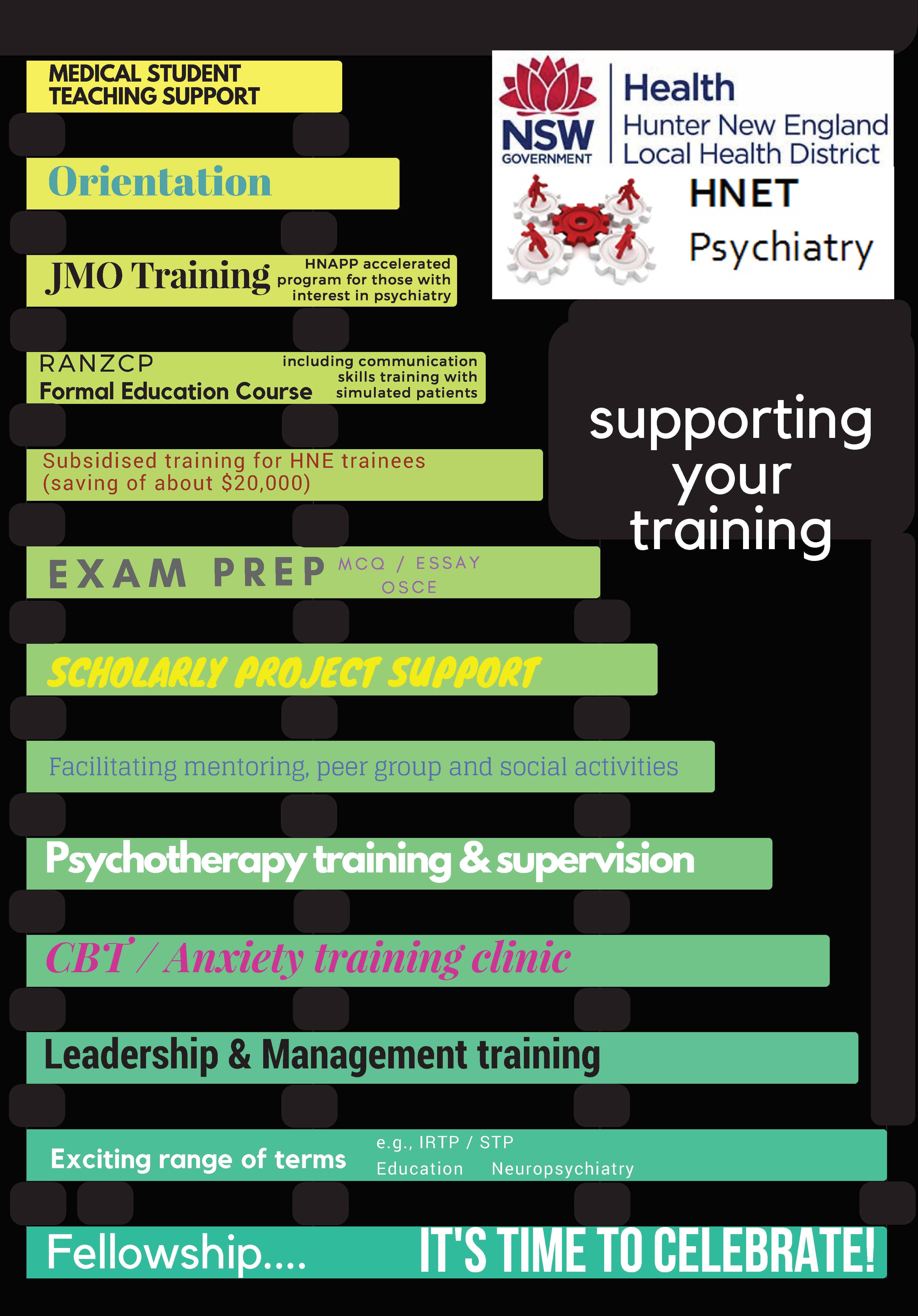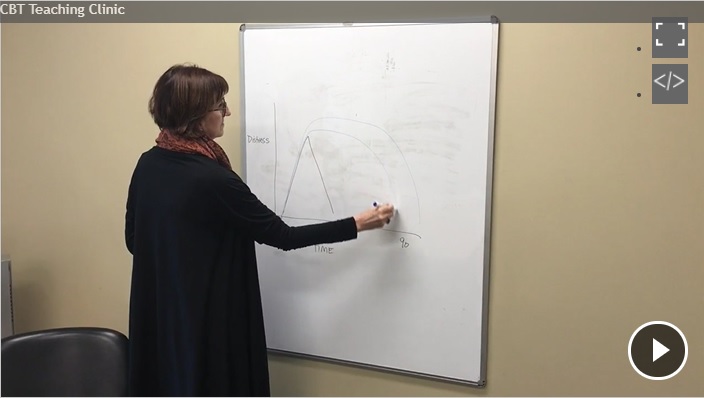Psychiatry Training
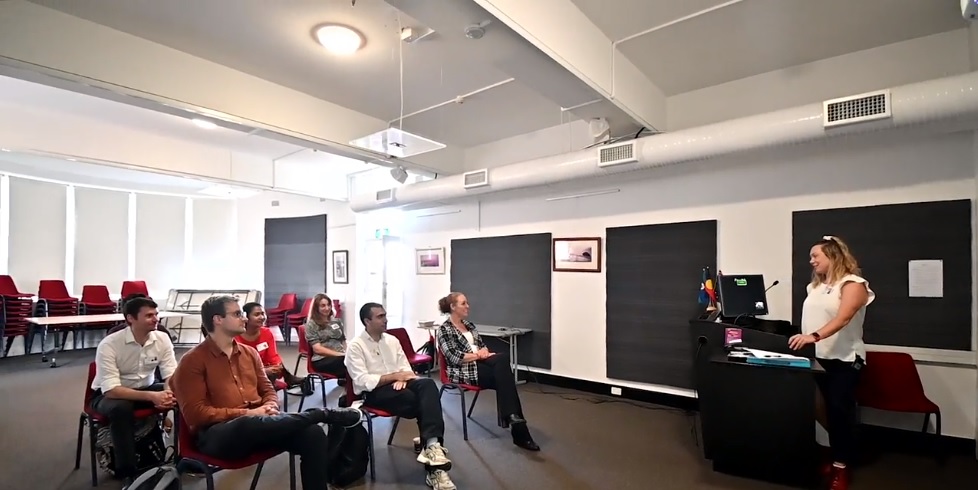
HNET is the only one of the five networks in the State to be based outside of Sydney and has a proud tradition of producing high quality local graduates in Psychiatry. Our pass rates for exams over recent years have been on average as high or higher than the NSW or binational averages. Most trainees will commence their training in an inpatient setting and rotate through a variety of experiences in Inpatient, Community, Consultation-Liaison, Child and Adolescent, Old Age, Neuropsychiatry, Psychotherapy, Forensics, and much more.
A major advantage is that all subspecialties can be provided within HNET – you can undertake a broad range of experiences whilst continuing with one program and one employer. Trainees in HNET have access to a range of terms in the HNE Local Health District, including rural terms in either Tamworth, Armidale or Taree. HNET trainees have access to a local RANZCP-accredited Formal Education Course that is subsidised by the network, as well as additional support from a range of Specialist Coordinators of Training (SCoTs).
Psychiatry Training Formal Education Course
Our Formal Education Course (FEC) is fully accredited by the Royal Australian and New Zealand College of Psychiatrists and is completely free of charge for trainees working with HNELHD. The FEC runs every Wednesday afternoon from 2.40pm to 5pm, and Hunter New England's Grand Rounds in Psychiatry for HNE staff is from 1.30pm to 2.30pm. The Formal Education Course is Zoom-linked throughout Hunter New England, state-wide and nationally.
 STAGE ONE Psychiatry Formal Education Course - Program
STAGE ONE Psychiatry Formal Education Course - Program 
 STAGE TWO Psychiatry Formal Education Course - Program
STAGE TWO Psychiatry Formal Education Course - Program
- HNET Formal Education Course - Information and Orientation
- FEC trainees can access the FEC Blackboard (where you can download your resources for FEC sessions) at: https://mylink.hnehealth.nsw.gov.au/course/view.php?id=240
Visit the HNET eLearning Centre via ![]() . This is also available as an app!
. This is also available as an app!
- Log in using your network username and password.
- Enter the site address as: https://mylink.hnehealth.nsw.gov.au
- Navigate to 'My Courses' and choose 'Hunter New England Training in Psychiatry'
2012 Fellowship Program
Detailed information about the 2012 Fellowship program in psychiatry training is available via the Royal Australian and New Zealand College of Psychiatrists website.
Welcome to the RANZCP Fellowship Program
Resources for Supervisors
Resources for Directors of Training and supervisors of trainees under the new 2012 (competency-based) Fellowship Program can be found at the following link - https://www.ranzcp.org/Pre-Fellowship/assessors-and-supervisors/2012-Fellowship-Program-supervisor-resources.aspx
These resources include a series of videos about rating an OCA (Observed Clinical Activity), filling in an ITA (In-Training Assessment), and giving feedback.
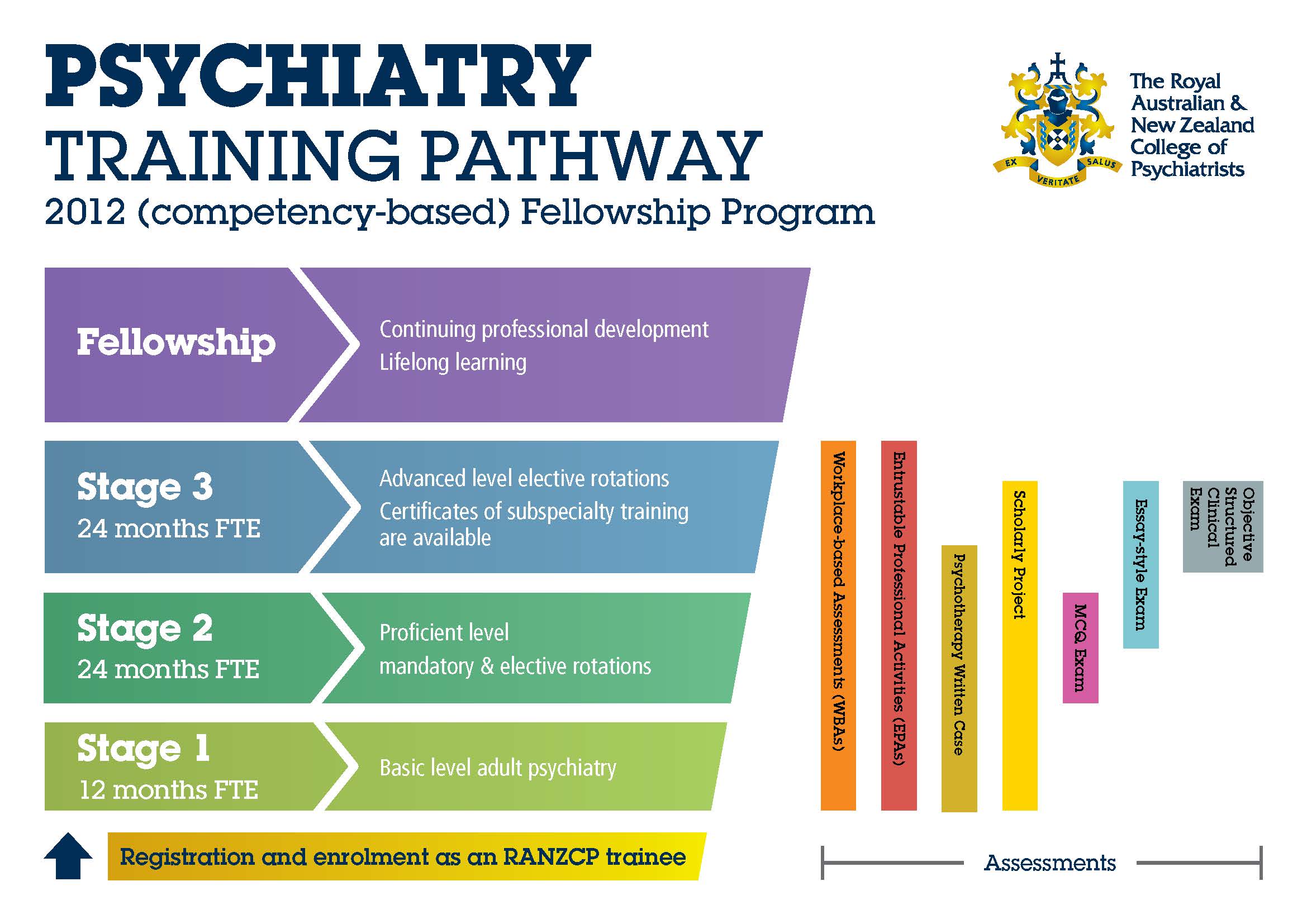
Advanced Training (Stage 3)
At the completion of Stage 2 training, trainees automatically become Stage 3 generalist trainees, there is no need to apply or notify the College. If a trainee wishes to pursue a subspecialty certificate of advanced training, further steps should be taken to apply. Information about Stage 3 requirements and certificates of advanced training can be found at the links below:
Dr Michelle Johnstone, an advanced trainee with HNET said:
"Deciding on a subspecialty for advanced training was tricky as I had enjoyed the majority of my psychiatry rotations. In the end, I narrowed my choice down to two subspecialties that I felt particularly interested in and thought I would be happy practicing long term. I did two terms in each of these subspecialties and spoke with the service directors and the Director of Training. I was then advised to speak to various people, including other advanced trainees and the NSW Directors of the Advanced Training programs. In the end, my decision was based on the team I would be working with, the amount of support I thought would be available, and the practicality of training in that subspecialty locally".
Registrar Term Descriptions
- Acute Care Team
- Armidale Clark Centre
- CAMHS CL/YES - John Hunter Children's Hospital
- CAMHS Hunter Valley Community - Maitland
- CAMHS Lake Macquarie Community - Charlestown
- CAMHS Newcastle Community - Hunter St, Newcastle
- CAMHS Nexus Inpatient - John Hunter Hospital
- CAMHS Rural (Northern) - Tamworth
- CAMHS Safeguards Newcastle Community
- CAMHS Wiyiliin Ta Community (PWP) - James Fletcher Hospital
- Consultation-Liaison (C-L) - Calvary Mater Hospital
- Consultation-Liaison (C-L) - The Maitland Hospital
- Consultation-Liaison (C-L)- John Hunter Hospital
- Consultation-Liaison (C-L)- Tamworth Hospital
- Forensic - Kestrel
- Hunter Valley Mental Health Service (inpatient) MMHU
- Hunter Valley Mental Health Service (outpatient)
- Hunter Valley - GP ARST
- Lake Macquarie Mental Health Service (inpatient)
- Lake Macquarie Mental Health Service (outpatient) Charlestown
- Manning - Taree (inpatient & community)
- Manning - GP ARST
- Mayo Private Hospital - Taree
- Mental Health & Substance Use Service (MHSUS) - Mater (inpatient)
- Mental Health & Substance Use Service (MHSUS) - Mater McAuley Centre (outpatient)
- Neuropsychiatry Service - The Mater Hospital & Morisset Hospital
- Newcastle Mental Health Service (inpatient)
- Newcastle Mental Health Service (outpatient)
- NMHEC-RAP (Telepsychiatry)
- Older People's Mental Health Service (OPMHS) - Mater (inpatient)
- Older People's Mental Health Service (OPMHS) - HV (community)
- Older People's Mental Health Service (OPMHS) - Lake Macquarie (community)
- Older People's Mental Health Service (OPMHS) - Newcastle (community)
- Psychiatric Emergency Services (PECC & MHICU - Mater Mental Health Centre)
- Psychiatric Rehabilitation Service, ISMHU (Intermediate Stay Mental Health Unit) - James Fletcher Hospital
- Psychiatric Rehabilitation Services, Morisset Hospital
- Tamworth - Banksia (inpatient)
- Tamworth - Community Mental Health
Specialist Coordinators of Training (SCoTs)
HNET employ a number of Specialist Coordinators of Training to provide expertise in specific areas and assist with coordination of various training activities. We invite you to meet our SCOTs by clicking the links below:
 | |
 | |
 | SCOT for CL Psychiatry & Psychotherapy Educator (Dr Vinod Raveendran) |
 | |
 | SCOT for Child & Adolescent Psychiatry (Dr Deepika Yerrakalva) |
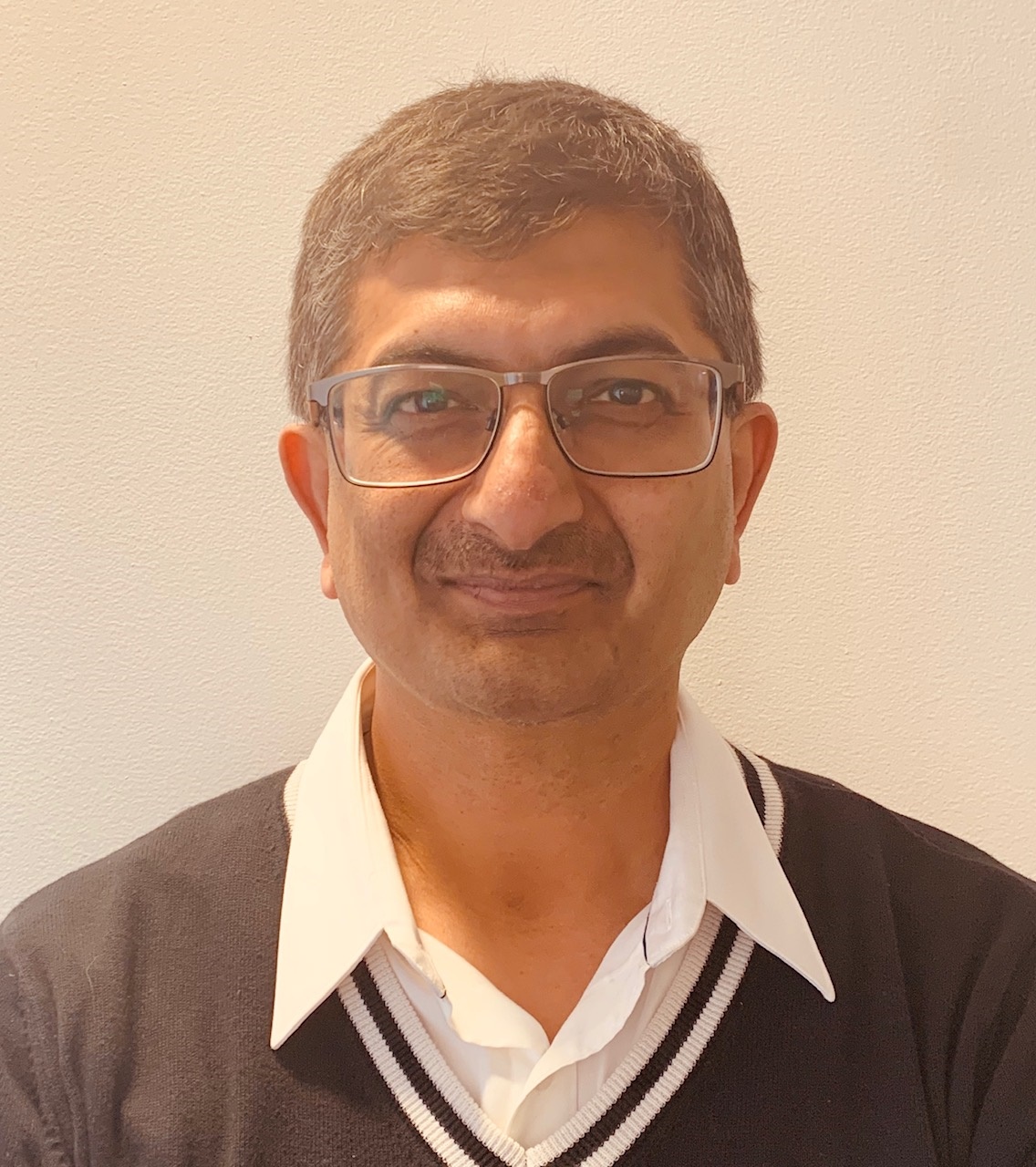 |
MediLINK
Medical Administration
Unrostered Overtime Process - Hunter New England Mental Health
Weekend On-Duty Medical Officer Log (for recording overtime)
Staffing
Please contact HNELHD-MESOpsych@health.nsw.gov.au for medical officer allocation lists for Hunter New England Mental Health Service
Examination Preparation & Hurdle Tasks
- HNET Exam Prep Booklet - HNET doctors can download the booklet from the HNET eLearning Centre.
- Recommended texts
HNET provide an examination preparation program for those preparing to undertake the RANZCP writtens. Trainees are invited to access exam prep resources on the HNET eLearning Centre.
Scholarly Project
All trainees training under the 2012 RANZCP by-laws are required to complete a 'scholarly project' by the end of 54 FTE months of training. The college website contains general information about the project as well as further links for relevant forms, policies and procedures etc.
One of the roles HNET has established is that of Specialist Coordinator of Training (SCoT) for the Scholarly Project. The SCOT is available to assist trainees in this aspect of their requirements, supervisor some projects and act as general mentor and cheer squad.
Leadership & Management
Stage 3 trainees are required to undertake formal learning opportunities in leadership and management as part of their training. The NSW Branch Training Committee have revised requirements for the Stage 3 Leadership & Management experience. These guidelines can be viewed here. The HETI course available for the Stage 3 L&M experience is here: https://heti.edu.au/our-courses/introduction-to-leadership-in-psychiatry
Feel free to discuss with the Director of Training to ensure that the plans you have will meet the minimum requirements for College.
Psychotherapy
Psychotherapy Written Case: Trainees requiring long cases and supervision for these should follow this procedure. If you work in HNET and want access to our psychotherapy booklet with lots of useful information, contact HNELHD-MESOpsych@health.nsw.gov.au.
CBT: A/Prof. Lisa Lampe is our Specialist Coordinator of Training (SCOT) for Assessments and will be assisting trainees to gain experience in CBT by running a CBT Teaching Clinic. Click below to watch a short video describing the clinic.
Rural Scholarships
The HETI Rural Medical Trainee Scholarship supports medical trainees committed to training and providing patient care in rural locations in NSW through the continuum of their training and education years.
More information regarding HRMS is available via the HETI website.
In addition to the HRMS, HNET has opportunities for integrated rural training pathways (IRTP) for RANZCP accredited trainees. Click here for more information.
Testimonials from trainees who have done rural rotations in HNET:
"In many ways, my year in Tamworth was the best year of my training. Originally a GP trainee, it was this rural experience of psychiatry that almost certainly led to me 'jumping ship'. I loved the variety of clinical experiences gained working in a general unit, without the rather artificial subdivisions along the lines of age, comorbidities and forensic issues that are seen in urban settings. I was supported by an excellent consultant, who remains a close friend and mentor to this day. And it was a pleasure to provide a service to patients and families that were so often incredibly grateful for the assistance. The interaction between inpatient and community teams was very supportive with excellent communication despite the often vast distances between teams". - Dr Alison Moffatt, Registrar.
"The Taree Mental Health Unit rotation was fantastic. It was a friendly and supportive environment with staff who were grateful for the presence of a training registrar. There was an enormous variety of clinical experience gained from both inpatient and outpatient work. The partnership between the inpatient and the community teams was impressive with a natural and logical flow of patient focused care. As a trainee, the scope for expanding your clinical experience is vast with the option to be involved with more than just the inpatient unit. During my term, I was involved with the management of patients ranging in age from adolescents through to older age, ECT, anorexia nervosa, clozapine clinic, behaviourally disturbed dementia patients, and patients with intellectual impairment. It was great to be a member of a team who provide comprehensive mental health care to the local community". - Dr Mariann Jackson, Registrar.
"I thoroughly enjoyed my time in Armidale, so much so that I decided to stay on for an extra six months, and in the end I was sad to leave. The variety is unmatched by any other term; inpatient work at the Clark Centre (8 bed voluntary inpatient unit), outpatient clinics (including exposure to older persons, child and adolescent), outreach clinics to remote sites e.g., Glen Innes, Tenterfield; CL work in the general hospital; teaching at UNE; Aboriginal clinics. There is the capacity to shape your term (with regards to the types of patients seen) to suit your learning needs and to meet college requirements. The supervision provided was excellent and both the inpatient and community teams are friendly and very experienced. I think that Armidale as a town is a great pick for a rural rotation. There are good pubs, cafes, restaurants and you never have to worry about traffic or finding parking". - Dr Brenton McKewin, Registrar.
Mid-rotation & End-rotation Forms
Trainees must initiate WBAs, EPAs, and mid/end ITAs in InTrain online. For full-time pro-rata trainees, your end-rotation ITA must be accompanied by at least two Entrustable Professional Activities (EPA) forms (with associated Workplace-Based Assessments [WBAs], one of which must be an Observed Clinical Activity [OCA]).
Access to InTrain is through the College website at: https://intrain.ranzcp.org/
Buddies & Mentors
HNET promotes both buddying and mentoring as proven tools to assist trainees in their development.
What does buddying involve? Buddying is a structured and time limited process whereby a current employee assists a new employee to make a good start in their role. In the context of the psychiatry trainee, HNET encourages Stage 2 and 3 trainees to buddy with new trainees for their first term. This involves:
- Regularly meeting with your buddy
- Going through a list of common things that new trainees need to learn or know about HNET, HNELHD and RANZCP training
- Being a support and positive role model
- Helping to explain and augment the formal orientation programs
Contact HNELHD-MESOpsych@health.nsw.gov.au to register your interest in being a HNET buddy.
What does mentoring involve? In the context of working in psychiatry, mentoring is valuable non-supervisory support for doctors where a more experienced person guides the less experienced person's development. A mentor should not be the manager or supervisor of the mentee, and mentorship should not be performance-based. It is more a space where the mentee can learn by sharing, planning and generally feeling supported.
HNET encourages trainees of all stages to act as a mentor to interns and residents involved with the Hunter New England Accelerated Psychiatry Program (HNAPP).
Contact HNELHD-MESOpsych@health.nsw.gov.au to register your interest in being a HNAPP mentor.
Additional useful resources
- Click here to download the HETI Mentoring Guide for mentoring rural medical trainees.
- HETI: Trainee in Difficulty Handbook
- HETI provides a useful learning module on being a mentor - available at My Health Learning: http://myhealthlearning.health.nsw.gov.au/ (An introduction to mentoring – 30 minutes. Course Code: 58519943)
- RANZCP module links – available Learnit. [member log-in required].
Three mentoring modules, created to assist you to become involved in a mentoring partnership in the future, are now available on Learnit. [member log-in required].
Each module will take approximately 30–45 minutes to complete. If you have any questions about the RANZCP mentoring program, please contact mentoring@ranzcp.org or phone (03) 9601-4929.
Cultural Consultation Program
Dr Bipin Ravindran is the Clinical Lead for this program, which provides consultation, support and training to the Hunter New England Local Health District. It includes a clinic providing assessments for persons from culturally diverse and refugee backgrounds and works in a collaborative model with local health and community services. The key aspects of the program and clinic are:
1. Flexible referral process aimed to improve barriers to access health services and facilitate inter-service partnerships.
2. Assessments done at home or the patient's preferred environments providing a whole of family approach to assessment and case formulation.
3. Collaborative assessment, formulation and care with refugee health and multicultural service and state based trauma service, STARTTS (NSW service for treatment and rehabilitation of torture and trauma survivors).
4. Collaboration with state based program, mental health community living supports for refugees and asylum seekers (CLSR).
5. Program has a clinical lead and collaborates with mental health specialities including child and adolescent psychiatry, Dual Diagnosis and liaison psychiatry in providing clinical assessments and ongoing support.
6. Teaching program covering domains of social and cultural psychiatry for psychiatry trainees. The program collaborates with local refugee and trauma services in providing training to health care providers in areas of cultural psychiatry and refugee mental health.
Psychiatry trainees wishing to undertake workplace based assessments for their cultural psychiatry training requirements can contact Dr Bipin Ravindran.
Health & Wellbeing
Watch this video about starting as a new doctor, your wellbeing and access to supports.
Your health and wellbeing is one of our highest priorities. The Australian Doctors Health Network is a great place to do some confidential self-checks and seek advice about helping your colleagues. Doctors are not always good patients and often play down symptoms, delay consulting a GP and are sometimes reluctant to take advice. If you have concerns about a physical symptom, don't try to assess it yourself. Consult a GP.
If you have any concerns about yourself or a colleague you can have a confidential conversation with one of the JMO support staff below. We are here to help. If you need to talk our door is open. You can always talk to your supervisor, your mentor, or your Specialist Coordinators of Training / Director of Training. If you prefer contact external to HNET, the supports below are available.
NSW Health JMO Support Line: 1300 JMO 321 (1300 566 321)
RANZCP Member Welfare Support Line: 1800 941 002, www.ranzcp.org/support
HNELHD Employee Assistance Program (EAP): (02) 4985 3289
Doctors Health Advisory Service: (02) 9437 6552
Are you OK? website: www.jmohealth.org.au
For emergencies dial 000
If you have concerns about your emotional wellbeing, you can use these online tools below to see whether you should be seeking further advice:
- The Kessler 10
- The ProQOL
- For difficulties with alcohol use, try the AUDIT Questionnaire
beyondblue has many resources to help people recognise symptoms of anxiety and depression, and to find about about available treatments. Common signs that you or a colleague might be struggling:
- Work or personal stress
- Burnout
- Anxiety
- Depression
- Alcohol and drugs use
- Making mistakes
- Disrupted sleep
- Compassion fatigue
- Withdrawing socially
NEW APP TO SUPPORT RESILIENCE
HETI's Building Individual Resilience App is a new resource designed to support staff to learn ways to 'bounce back' and respond positively and productively to challenge and change. Developed in collaboration with the subject matter experts from LHDs and the NSW Ministry of Health, the App allows users to explore how resilient they are, and ways to handle challenges positively. The app can now be downloaded from the Apple and Google Play stores:
* Apple: https://itunes.apple.com/us/app/building-individual-resilience/id1457648116
